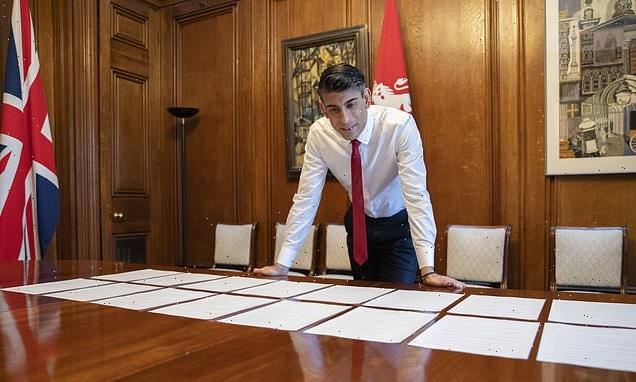Taxing jobs as we face a cost of living crisis is the economics of the madhouse, writes ALEX BRUMMER
The cost of living is soaring – filling up the car and buying food at the supermarket is becoming more expensive by the day, while a sharp hike in energy bills is imminent.
With mortgage and borrowing costs also on the rise, the inflationary background to Rishi Sunak’s Spring Statement today could hardly be more stark.
The Chancellor insists he will ‘stand by’ hardworking families. Here’s how he can achieve that while encouraging wealth creation and making Britain the high-skills, high-pay economy we all want it to be.
The simplest way of easing inflation would be to consign to the dustbin the national insurance increase of 1.25 percentage points – forecast to raise £12billion in 2022-23 and designed to help clear the NHS waiting list and fund social care.
Taxing jobs when the country faces rising prices and a potential slump – something that has followed almost every previous energy crunch – is the economics of the madhouse.
With mortgage and borrowing costs also on the rise, the inflationary background to Rishi Sunak’s Spring Statement today could hardly be more stark. Pictured: The Chancellor runs through his Spring Statement speech in his offices in 11 Downing Street, March 22
Thanks to falling unemployment, receipts from self-assessment have soared by almost 22 per cent over the past 11 months, while income tax from those on payrolls has jumped by almost 14 per cent to £170billion – way ahead of last year’s £150billion.
The NI hike may have looked necessary last September before the jobs market took off. It is not any more.
Another way is for Sunak to rethink the corporation tax rise. This is due to rise from 19 per cent to 25 per cent in 2023 in another effort to balance the budget.
But lower corporation tax rates pay for themselves. In 2009-10, the levy stood at 28 per cent and receipts were just over £40billion. But in 2020-21, with the tax down to 19 per cent, receipts soared to almost £55billion – in spite of Covid.
It’s a celebrated paradox: the lower the taxes, the greater the profit incentive and the more tax generated.
Sunak also plans to incentivise companies to invest more by offering more tax breaks for Research and Development. No one could argue with that.
But he needs to go much further and keep the headline rate competitive.
And to ease the cost-of-living crisis, the temporary VAT cuts for hospitality introduced during Covid should be reinstated.
Britain’s hospitality industry is still reeling from the pandemic and now inflation means that many customers will stay at home because of rising prices.
Cutting the VAT on energy bills, a Labour Party proposal, could also help and release cash for spending elsewhere
As for fuel duty, the Chancellor’s suggested 5p cut per litre will help – but looks measly given the prices at the pumps.
The Chancellor’s suggested 5p cut per litre will help – but looks measly given the prices at the pumps. Pictured: A display sign showing fuel prices at a Shell station in Leamington Spa
Sunak should also reform business rates. These are deeply unfair. As more sales have moved to the online giants, the burden on local shops and businesses has caused desolation on high streets. What is needed is a new ‘micro-charge’ added to every online sale.
Meanwhile, during Covid, cutting stamp duty to 0 per cent on homes costing up to £500,000 helped both to stimulate deals and provide an unexpected 70 per cent boost to the Exchequer.
Sunak should reintroduce the stamp-duty holiday to stimulate the market and encourage transactions.
And finally, the Chancellor should encourage wealth creation. There is a tendency in Britain, particularly on the Left, to abhor dividends, bonuses and gains from entrepreneurship.
But taxes on dividend income, capital gains and inheritance are critical to funding public services. We should be encouraging enterprise and entrepreneurship by making it clear wealth will not be penalised.
Source: Read Full Article


